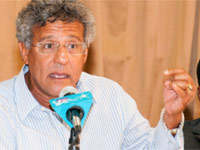Last month the Bahamas National Youth Council, a non-profit organization representing youth voices in the country, commemorated Caribbean Youth Day with a youth march and forum. President of the council Tye McKenzie publicly associated himself with rational and bold albeit unpopular positions on Caribbean integration and I salute him for doing so. It made me think, regionalism is not dead in the Bahamas after all: It was a thought that gave me hope. In fact, it inspired me, as a fellow advocate of regional integration.
But it also made me think: How unfortunate that supporting a simple idea such as proudly affirming a Caribbean identity, and the “beckoning reality of integration and corporate development as a region” would be a bold action in this age of collapsing borders and social networking.
Caribbean people today are probably more integrated than in any other time in our history. And yet, today, anti-integration sentiments still hold major political currency, and it still seems rationale to assert that regional integration is irrelevant.
In the case of the Bahamas, we continue to resist the idea that the Haitian presence is not in fact anti-Bahamian, but is quintessentially Bahamian. Illegal immigration clouds the consciousness, but in reality, the two nations have always shared a close economic and cultural relationship, not to mention that familial ties are deeply entrenched in the Bahamian identity.
Illegal immigration also creates the false perception that people in the wider Caribbean hate their countries and see the Bahamas or their chosen destination as the Promised Land, which could be nothing further from the truth; and the false perception that immigrants are somehow inferior, low-grade, even depraved human specimens, which of course, is not only untrue, but highly ignorant.
We have yet to come to terms with the simple idea that our relationship with the United States of America, particularly our historical connections to the Carolinas and South Florida, does not negate our connection to the Caribbean region. Our geography has always placed us in a unique cross-border position: American and Caribbean; Western and Colonial; influential and inconsequential, sprawling and diminutive. For these and many other reasons we “exude the essence of a liminal existence”, as cultural scholar Dr Jahlani Niaah has observed in the past.
A large population of our political and business class were educated in regional institutions and in their private lives many of them manifest the essence of regionalism. Their contemporary politics would not suggest so because it has called for them to virtually rebel against their own upbringing. And in doing so, they have led a subliminal disintegration movement with a pervasive effect on public consciousness.
In almost every sphere of Bahamian society – politics, education, the public service, civil society, and business – Bahamians with Caribbean heritage are and have been leading figures. The Bahamas’ fledging police and defence forces were riddled with Caribbean nationals; so too was the teaching and nursing professions. This was not a mark of Bahamian inferiority. It reflected population dynamics and a Caribbean reality, which was later made problematic for political expediency due to evolving socio-economic and geopolitical realties.
Politics aside, the Bahamas has always been integrated. The current governor general Sir Arthur Foulkes is of Haitian heritage. Junkanoo Queen and cultural pioneer Maureen “Bahama Mama” Duvalier was also of Haitian ancestry. The Maynard political dynasty is of Bajan heritage. Beloved Canon Neil Roach was himself born in Trinidad and Tobago. Paul Thompson, a well-respected former assistant commissioner of police was also born in Trinidad. The first black man to sit in the Bahamas House of Assembly was Stephen Dillette of Haitian ancestry. And the first black man to lead the nation, Sir Lynden Pindling, was of Jamaican heritage.
Given the level of integration present at all levels of our society, historically and contemporarily, I question the notion of a pure Bahamian identity, and the political motivations of those who promote such a concept.
By Noelle Nicholls
Tribune Feature Editor
For the entire article, click here.


